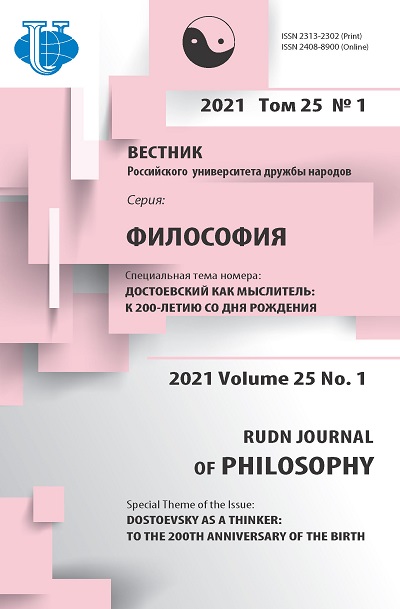Philosophy of Music in the Image of the World: From Antiquity to the Modern Time
- Authors: Kolomiets G.G.1
-
Affiliations:
- Orenburg State University
- Issue: Vol 25, No 1 (2021): DOSTOEVSKY AS A THINKER: TO THE 200TH ANNIVERSARY OF THE BIRTH
- Pages: 139-155
- Section: PHILOSOPHY. RELIGION. CULTURE
- URL: https://journals.rudn.ru/philosophy/article/view/25918
- DOI: https://doi.org/10.22363/2313-2302-2021-25-1-139-155
Cite item
Full Text
Abstract
The article presents philosophical views on music in the context of the transformations of the worldview from Antiquity to the Modern Time. In this research author also mentions the contemporary issues, and uses her own philosophical concept of the music, which can be described as following: the value of music as a substance and the way of the valuable interaction of a person with the world affirm the essence of musical being, in which the invariable principle of Harmony, the principle of Chaos-Form movement, is preserved (see "The Value of the Music: Philosophical Aspect"). Music expresses the fluid essence of the world and changes of being in space and time. Philosophy of music as a field of philosophical knowledge considers music from ontological-epistemological and phenomenological-axiological prospectives, as something more than just a form of art. It explores the deep, ultimate foundations of the existence of music as such and the philosophical and aesthetic foundations of musical art. Since ancient times music has been a representation of the world in the human conscience and served as the harmonic equivalent of cosmological philosophy, mathematics, astronomy, and astrophysics (Pythagoras, Plato, Aristotle, Aristoxenus, Porphyry et als.). The scientific view on music was enriched in the Modern Time by the expanded view on the cosmo-sound space reflected in musical art, which at the same time transforms the mathematical ideas of geometricity, squareness etc. The tendency to create integral world music in the musical practice of the XX-XXI centuries explains the attempt of mankind to present music by modern methods of composing musical art as an expression of fear towards the secret Harmony of universal existence, and, on the other hand - as a form of search for salvation and mental balance, intuitively reflecting what is happening in natural science, which more and more points to the abyss of unknowable universe, and the unstable place of man in the world.
Keywords
About the authors
Galina G. Kolomiets
Orenburg State University
Author for correspondence.
Email: kolomietsgg@yandex.ru
Doctor of Sc. in Philosophy, Honorary Worker of the Sphere of Education of the Russian Federation, Professor, Department of Philosophy, Cultural Studies and Sociology
13, Pobedy avenue, Orenburg, 460018, Russian FederationReferences
- Azroyants EA. Periodic Table of Fractal Evolution. In: Modern Picture of the World. The Formation of a New Paradigm. Moscow: Noviy vek; 2001. (In Russian).
- Kolomiets GG. The Philosophy of Music in the Aspect of Axiology [online]. Abstracts of the reports of the XXIV World Philosophical Congress «Learning to be Human» (Beijing, China, August 13—20, 2018). URL: http://www.congress2018.dialog21.ru/reports/ kolomietsh.htm#eng.
- Kolomiets GG. Value of Music: Philosophical Aspect. Moscow: URSS; 2007. (In Russian).
- Jamblichus. About Pythagorean Life. Moscow: Aletheia; 2002. (In Russian).
- Losev AF. Filolai. Antique Musical Aesthetics. Moscow: Muzgiz Publ.; 1960. (In Russian).
- Zoltai D. Ethos and Affect. History of Philosophical Musical Aesthetics from Inception to Hegel. Moscow: Progress; 1977. (In Russian).
- Kolomiets GG. Aristotle Philosophy within the Meaning of the Ontological Status of Music. RUDN Journal of Philosophy. 2018;22(1): 55—64.
- Aristotle. Politics. In: Aristotle. Works in 4 vol. Vol. 4. Moscow: Mysl' Publ.; 1984. P. 375—644. (In Russian).
- Losev AF. The History of Ancient Aesthetics. The last centuries. Book 1. Moscow: "AST" Publ.; 2000. (In Russian).
- Makhov АЕ. MUSICA LITERARIA: The Idea of Verbal Music in the European Poetics. Moscow: Intrada Publ.; 2005.
- Shestakov VP. Musical Aesthetics of the Western European Middle Ages and Renaissance. Comp. texts and general entry article by VP Shestakov. Moscow: Muzica Publ.; 1966. (In Russian).
- Kepler J. Harmony of the World Book IV. In: Musical aesthetics of Western Europe of the 17th-18th centuries. Moscow: Muzica Publ.; 1971. (In Russian).
- Kircher A. Musurgia Universalis. In: Musical aesthetics of Western Europe of the 17th—18th centuries. Moscow: Muzica Publ.; 1971. (In Russian).
- Weber A. History of European philosophy. Moscow: LCI Publ., 2007. (In Russian).
- Gilbert KE, Kuhn H. The History of Aesthetics. 2nd Ed. St. Petersburg: Progress Publ., 2000. (In Russian).
- Shestakov VP. Harmony as an aesthetic category. Moscow: Nauka Publ.; 1973. (In Russian).
- Matteson I. The Perfect Bandmaster. Musical Aesthetics of Western Europe of the 17th—18th Centuries. Moscow: Muzica Publ.; 1971. Pp. 235—276. (In Russian).
- Schelling FWJ. Philosophy of Art. Under the general. ed. MF Ovsyannikova. Moscow: Mysl' Publ.; 1999. (In Russian).
- J. From pictures of the world to the living world. Bulletin of Moscow University. Series 7. Philosophy. 2010;(1): 3—14. (In Russian).
- Hamel PM. Through the music to yourself. How do we know and perceive music. Moscow: Classica-XXI Publ.; 2007. (In Russian).
- Steckel R. Herz der Wirklichkeit. Wuppertal: Yugenddienst Verlag; 1973.
- Bozhikova MB. Musical composition in the twentieth century: between the projections of monads and rhizomes. In: Music and Philosophy. Moscow: PROBEL-2000 Publ.; 2012. (In Russian).
















